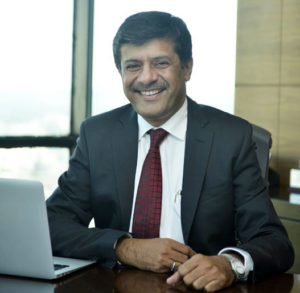By Nishant Arora
New Delhi– To become digital in a true sense, Indian enterprises have to work on information technology (IT), workforce and security together to solve the big jigsaw puzzle and stay ahead in the coming cashless era, a top Dell-EMC executive has emphasised.
In the last 15 years or so, IT has been solely focused on data centres and a running system of records (a data management term for an information storage system).
“The way we worked and communicated has all changed and this has put a lot of pressure on the back-end IT infrastructure. The world has moved onto smartphones and we need better infrastructure, networking and security to stay ahead,” Rajesh Janey, President and Managing Director, India Enterprise (Dell-EMC), told IANS in a free-wheeling interview.
 In the making for over an year, the world’s largest technology merger between the two giants — EMC in storage systems and Dell in personal computers — formally came into being on September 7 this year.
In the making for over an year, the world’s largest technology merger between the two giants — EMC in storage systems and Dell in personal computers — formally came into being on September 7 this year.
Touted as the world’s largest privately-controlled tech company at $74 billion, it now has an extensive portfolio spanning computers and Hybrid Cloud, to infrastructure and software-defined data centres.
According to a latest industry survey by Dell with digital transformation research firm Greyhound Research, Indian organisations are the most digitally mature globally as nine in 10 enterprises in the country have witnessed the entrance of new competitors as a result of digital technologies.
But all is not achieved yet, said Janey, adding that with new technologies come new challenges.
“IT transformation means I should be able to efficiently capture data at the backend, analyse it, process it and deliver. The cost of embedding intelligence in any device is dropping very low. Therefore, every device is generating lot of data and lot of intelligence. So that means the IT system has to use all of that intelligence,” Janey explained.
Data is being sent and coordinated in real-time like never before. This has put tremendous pressure on IT and the people associated with it.
“The people running IT have to change. If they were comfortable with the old ways of doing things, they have to get used to new ways of doing things. So that is workforce transformation,” Janey said.
“Third is security transformation. While you are shifting everything online and to the Cloud, it has to be absolutely secure and protected from data breach and cyber crimes,” the executive emphasised.
Today, companies with high regulatory framework, whether it is banks, telecom or government, are adopting new security platforms and there is a lot of awareness and a lot more compliance.
“There has been a lot of investment on security in the last 10 years in India — firewalls, encryption, real-time threat detection and ‘advanced persistent threats’. We at Dell-EMC are now set to provide next-generation security infrastructure to help enterprises move on the path to digital transformation,” Janey said.
Their partners and customers in India are excited at Dell-EMC coming together.
“The fact is that as EMC, we are very strong in certain areas of business but we had missing pieces. With Dell, all those missing pieces have come together. The customer is looking at a complete journey of digital transformation with us as he knows that with Dell-EMC, he can walk a longer distance,” Janey said.
The year 2017 is going to clearly focus on a complete digital transformation.
“First, the journey will be Cloud-enabled. Secondly, it will be more and more industry-standard server hardware oriented. Third, it will include software-defined data centres and last but not the least, it will be flash-only world on the storage front. Top this with security and a true digital transformation is not far for Indian companies,” Janey pointed out. (IANS)





